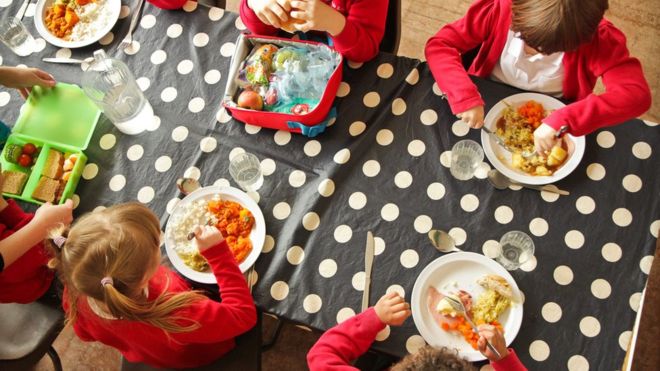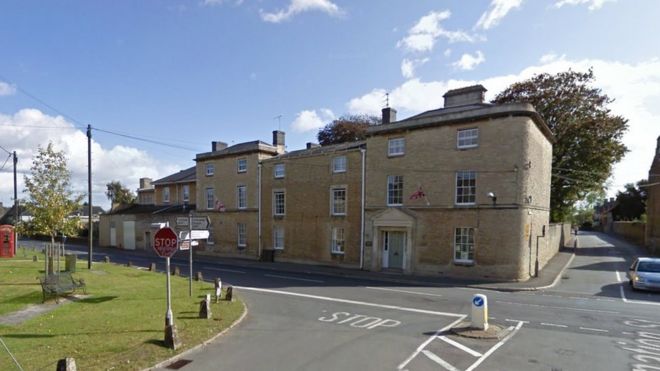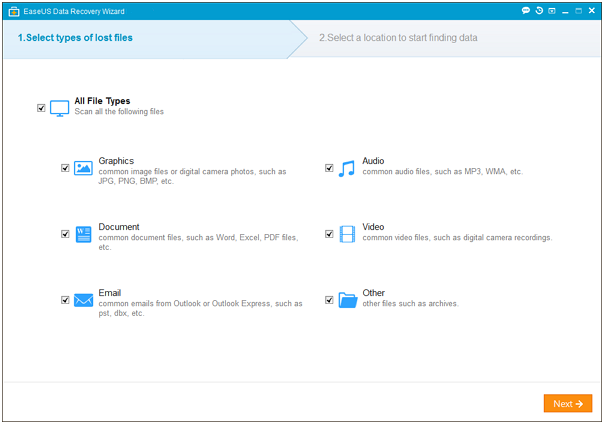
The Department for Education has refused to publish a report which said England’s smallest schools cannot afford to provide free school meals, according to a former policy adviser.
Restaurateur John Vincent, former adviser on school food, told BBC’s Radio 4 the move was “undemocratic”.
It comes after the government scrapped extra funding to help small schools with food costs earlier this year.
The department told the BBC it had taken the report’s advice “on board”.
The government introduced free hot lunches in September 2014 for all pupils in the first three years of school in England.
Under the policy, every primary school received a flat rate of £2.30 per child, per meal, with extra money made available for schools with fewer than 150 pupils.
However, in January the Department for Education announced on its website that the grant for small schools would not be continued.
‘Chose not to report’
Mr Vincent and Henry Dimbleby, who co-founded the Leon restaurant chain, led a government-commissioned independent review of school food and recommended the free school meal policy in their School Food Plan in 2013.
Last year the pair were made MBEs in the Queen’s Birthday Honours list for their work in improving school lunches.
In an interview for BBC Radio 4’s The Food Programme on Sunday, Mr Vincent said his taskforce reported to the government that there was an “ongoing structural issue” with having a small school.
They recommended that “probably around £2,000 to £2,300 per year should be provided to these small schools to make the whole provision of their school meals solvent”.
However he said: “The government chose not to publish that report. And that, to me, seems strange.”
Mr Vincent said the authors of the School Food Plan have asked the government to publish the report and even considered publishing it themselves.
He added: “The government have made it very clear that they don’t want us publishing it.”
The Department for Education told the BBC: “We are not going to publish the Small Schools Taskforce report.
“It wasn’t published last year because of the Spending Review and by the time that was complete, the report was out of date and much of it was already in existence.”
‘Massive amount of money’
Executive head teacher Karen Holmes, of Saints Way Church of England Multi Academy Trust, said she was “furious” when she discovered the funding for her schools had come to an end.
She said: “We had already had massive discussions with our directors about where we needed to save money, what we needed to do. And I knew then that was £10,000 wiped from my combined four small schools budget. Well £10,000, that’s the equivalent of a teaching assistant.”
“It’s a massive amount of money. So the curriculum budgets for all of these small schools, they’re not even £10,000.”
“The next step is losing staff, cutting hours. We’re already at a minimum because of the cuts we’ve taken anyway, with cuts in funding over the last couple of years.”
Jeanette Orrey, who co-founded of the Food For Life partnership and has received an MBE for her campaigning work on school food, said the impact of the funding cut had been felt across the country.
She said: “If you’ve got 150 pupils taking lunch great. But if you’ve only got 50 or 60 taking lunch then the actual economics, the finances of this don’t add up.
“How are we going to continue to feed the children on £2.30? It can’t be done.”
‘Structural disadvantage’
Mr Vincent said there should be a reallocation of the flat £2.30 rate, as some larger schools may be running a surplus.
He said: “If 20p were to be taken off the per-head cost at larger schools and given to the smaller schools, the funding mechanism would work.”
In its statement, the Department for Education said it took spending advice from the report “on board” and this was why the transitional funding was made available to small schools.
It has said previously that the funding “was always intended to be temporary to help small schools to put their meals service on a more sustainable footing”.
The department told the BBC: “Small schools received an additional £32.5m over two years – a significant contribution.”
Though there was no ongoing commitment to provide extra funding, Mr Vincent said: “The fact is there should have been. Because it’s an every year cost, it’s not just a one-off cost for extra ovens.”
He added: “It’s an every year, every month, every day additional cost that small schools need because they’re at a structural disadvantage.”
[Source:- BBC]












 Google has bought future output from two yet to be built wind power farms in Norway and Sweden to power its data centres in Europe, the company and farm developers said on Thursday.
Google has bought future output from two yet to be built wind power farms in Norway and Sweden to power its data centres in Europe, the company and farm developers said on Thursday.




